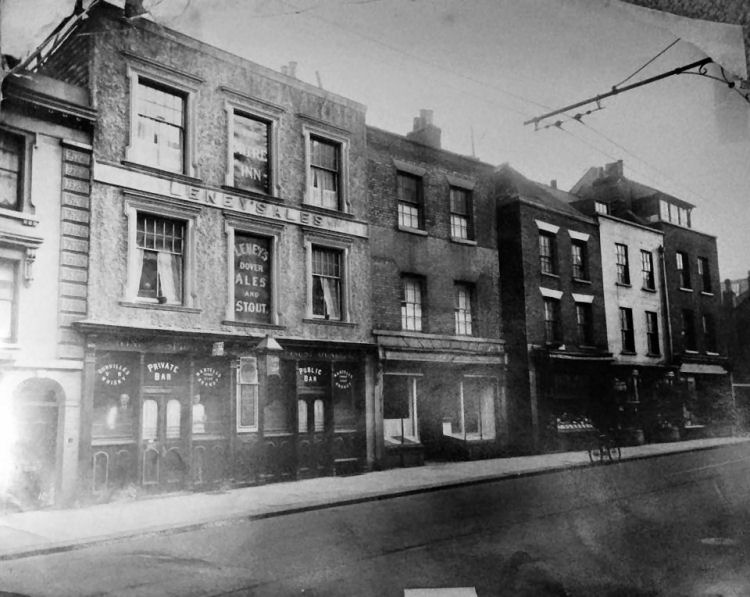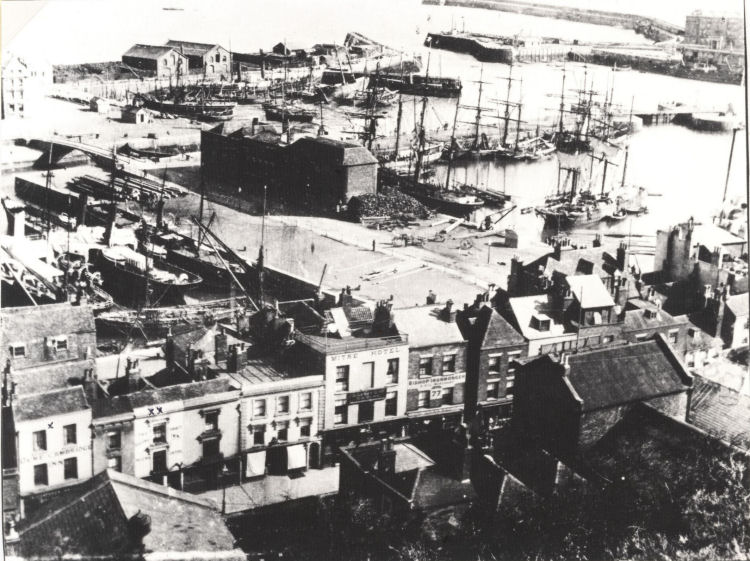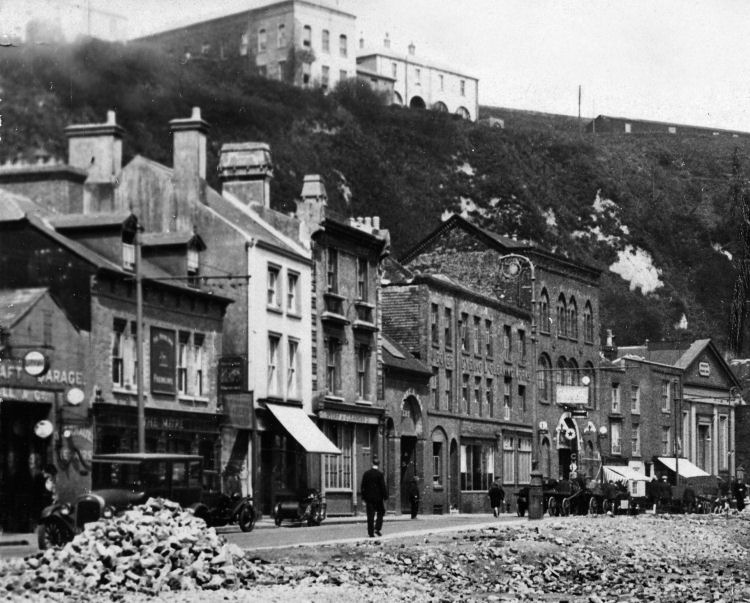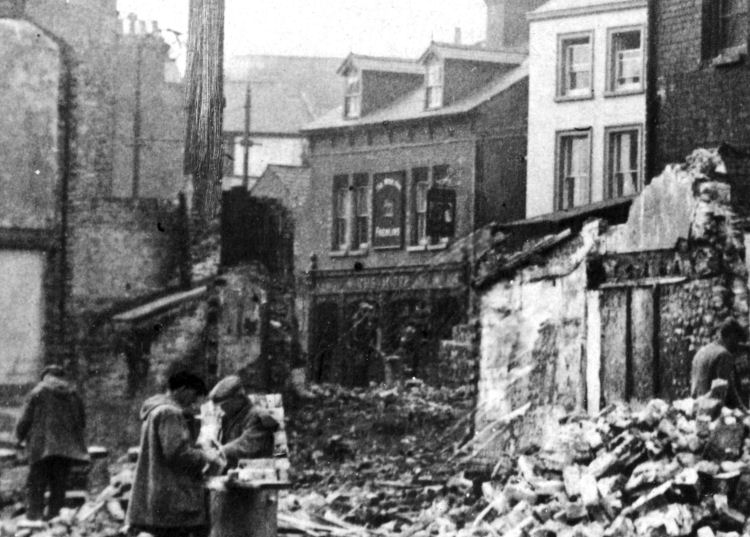|
92-93 Snargate Street and
26-27 Commercial Quay
77 Snargate Street
  
Dover

Above photo from the John Gilham collection, circa 1920. |
 |
|
The western docks, in 1880, with Snargate Street in the
foreground showing some of the properties swept away when Commercial
Quay was enlarged. The buildings now gone include those of the Duke of
Cambridge Inn, left, The Grand Shaft Inn, the Mitre Hotel and Bishop,
the Ironmonger. |
The first with this sign was on the other side of the street at number
77.
|
From the Dover Express and East Kent
Intelligencer, 12 April, 1878. Price 1d.
CHARGE OF ROBBING A TILL
Walter gaskin, a private in the 6th Regiment, was charged with
stealing from a till at the "Mitre Tavern," Snargate Street, about 11s.
in silver, the property of W. H. Stiles.
Annie Rivers deposed: I am barmaid at the "Mitre Tavern." Yesterday
morning, about half-past eleven, prisoners came into our bar and called
for a pint of beer. I served him, and he stood in the bar drinking it.
There was another man in the bar who drank with him. They both stopped
in the bar until half-past three in the afternoon. I sat in the bar
reading the paper and went to sleep. When I woke prisoner and the other
man were both gone. I had not been to sleep two minutes and both men
were there before I went to sleep. At half-past two some other men came
in and they were still there when I woke up. When I went to the till for
change, I found about 11s. in silver money had been taken - three
two-shilling pieces, a half-crown, and some small money. I immediately
told Mr. Stiles, and the other man named Francis came back again in
about three or four minutes after I had missed the money, and I accused
him of stealing it, but he denied having done so. I am sure prisoner is
the soldier who was with Francis. He could have reached over the counter
and taken the money from the till.
By the prisoner: I left the bar to go to dinner, and was away about
ten minutes. When I came back the money was there. The money was taken
while I was asleep. I did not see you take it. When Francis came back he
told me he saw you take the money. Francis was drunk but you were sober.
William Francis deposed: I am a joiner and live in Strond Street. I
was in the "Mitre tavern" all day. I went there about half-past eight in
the morning with a friend. I do not know what time prisoner came in, but
I saw him in there. I had been drinking all day with my friends. I paid
for it. I was not sober. I had a considerable quantity to drink - quite
enough. I saw the barmaid in the bar behind the counter, but I did not
notice her reading the newspaper. I did not see her go to sleep. I saw
the prisoner put his hand over the counter, but I did not see where his
hand went to, and I did not hear any money rattle. I cannot say I saw
him more than once. He went out and I also went out. I was going home,
but when I got outside the house I asked him to have a glass and
he said he did not mind if he did, so we went down to the "George
Inn" and had some brandy which I paid for. We drank the brandy
directly, and I then went back to look for my friend. I do not know
where prisoner went; he left me. When I went back to the "Mitre" I do
not know whether the barmaid accused me of taking the money.
By prisoner: I do not believe I went to sleep. I do not know whether
you went out during the time the barmaid was asleep. I did not hear any
money chink. I do not know what you did when you took your hand back.
Harry Walker deposed: I went into the "Mitre" with last witness
yesterday morning and remained there all day, and had a good lot
of beer. I saw prisoner come in about midday, but I do not know whether
I drank with him or not. I saw prisoner draw his hand from over the
counter. The barmaid was then in the bar asleep. he remained a short
time after and then went out with Francis. A few minutes after that the
barmaid discovered that she had lost some money and enquiries were made.
Francis came back in a short time and was accused of stealing it. The
place where I saw prisoner put his hand was just over the till.
Prisoner: If you heard me why did you not alarm the barmaid?
She woke up just after.
Prisoner: Do you believe I would do that in front of you and your
friend and several others?
It would look rather suspicious.
Sergeant William Neave, of the 6th Regiment, deposed that prisoner
was a drummer in the 6th. Witness was sergeant of the regimental guard
at the Grand Shaft when prisoners turned up at 8.45 in the evening. He
had been absent since eight o'clock in the morning and came in by
himself. He was sober. Witness made a prisoner of him and searched him,
when there was found on him a purse containing 9s. 1d. in money
consisting of one half-crown, two florins, two shilling pieces, a
sixpence, and two half-pennies. The first witness, the barmaid came in
and identified prisoner and gave him into custody. He did not know
whether prisoner had any money when he went out.
Annie Rivers, re-called, said she could not identify any of the
coins, but there was a lion shilling in the till.
The Superintendent, in answer to the Bench, said he did not
think he could get any more evidence.
The Bench said there was not sufficient evidence to convict and
discharged the prisoner.
|
|
From the Dover Express. May 1880.
Snargate Street.
The report of the superintendent of police as to the fire in Snargate
Street was read as follows.
Dover Police Fire Brigade.
May 4th 1880.
Gentleman,
I beg to report being called at 5.25 a.m. on the 27th ult. to a fire at
the Mitre public house occupied by William Styles. The hose reel and
hand pump were immediately sent for arriving on the spot at 5.33 when
smoke was issuing from the bar and from the upstairs window at the back.
A standpipe was fixed in Snargate Street and one at Commercial Quay and
a good supply of water obtained and thrown upon the fire at front and
back which was extinguished by about seven a.m. Damage, stock and
furniture in bar and kitchen entirely destroyed. Furniture and upstairs
rooms damaged by smoke and water. Walls and upstairs damaged by water
and windows by breakage and removal. Building insured in the Sun Fire
Office. Stock and furniture in the Kent.
Brigade in attendance superintendent and 16 firemen.
Mr Boulter chimneysweeper of No. 73 Snargate Street was proceeding with
Police Constable Knott to the cellar under the bar when the flooring
gave way and they were both thrown into the cellar. Knott escaped
without injury but Mr. Boulter received a severe injury to one of his
knees and has been under medical treatment ever since.
I am yours gentleman your obedient servant
T. O. Sanders, superintendent.
Information kindly supplied by Joyce Banks.
|
Some of its bars could be entered from 26 and 27 Commercial Quay. It
faced the Grand Shaft Barracks and was described as an inn early in the
century but as a tavern by 1882.
A fire broke out on 8 January 1888, following which a committee was
formed to discover why the hydrants failed. The mind boggles, but whatever,
it must have proved possible to effect repairs because the pub continued. In
a fashion I might add, because the licence changed hands sixteen times
between 1885 and 1906.
Supplied by Alfred Leney Co Ltd, who bought out Thomas Walker's Phoenix
Brewery in 1859 and registered as such in 1896, until bought out by Fremlin
Brothers brewery of Maidstone in 1926, brewing at the Dover brewery ceased
in 1927, which later passed to Whitbread.
|
From the Dover Express. January 1888.
Mitre Inn Snargate Street.
About an hour or so after closing time on Sunday night a fire broke out
at the “Mitre Inn” Snargate Street and before it was extinguished the
bar was fairly burnt out and other portions of the premises were
damaged. A town porter named Cecil Howell on passing about eleven
o'clock noticed that the bar was lighted up and this he immediately saw
was caused by fire. He shouted fire and aroused the inmates but before
this could be done several windows had to be broken. The occupants of
the house Mr. and Mrs. Adamson their two sons and four daughters it
appears on finding that the place was on fire escaped over a flat roof
into Mr. Bishops ironmongery premises next door.
In the meantime Sergeant Dulhie and his men who informed the Shaft guard
burst open the door of the Inn and the fire was kept in check by
throwing water upon it. Corporal Besford G.M.P. Mr. Bishop, Mr. Oram
and Mr. Hickens and others were assisting in this work. Information
having been sent to the fire and Police Station, the hose reel and fire
escape were quickly upon the spot together with the superintendent and
several firemen. A stand-pipe was fixed and within a short time the
fire, which had not obtained a very great hold, was extinguished. On
examining the premises the fire appeared to have originated under the
bar counter. The damage was principally confined to the bar. The
building was insured in the Sun Fire Office and the contents in the
Royal.
Credit is due to the porter Howell for his prompt action in arousing
the inmates who undoubtedly had a narrow escape and also for his after
assistance. The fire seemed to have caused considerable excitement among
the neighbours and one woman living near the chapel on descending from
her bedroom fell down a flight of stairs and severely cut her head.
Information kindly supplied by Joyce Banks.
|
|
From the Dover Express and East Kent News, Friday, 28 August, 1891. Price 1d.
DOVER LICENSING SESSIONS
ANOTHER TEMPERANCE OBJECTION
When the “Mitre Tavern” was reached in the list, that was singled out,
having been objected to by the Temperance Council.
THE MITRE
The objection in the case of the “Mitre Tavern” was withdrawn.
The Mayor said: I will now read the decisions of the Magistrates in the
following cases:-
The “Mitre,” license granted.
|
|
From the Dover Express and East Kent News, Friday, 18 September, 1891. Price 1d.
APPLICATIONS
Mr. Hatton Brown applied, on behalf of Mr. E. H. Foulser, for permission
to draw at the “Mitre Tavern.”
The application was granted.
|
|
From the Dover Express and East Kent News, Friday, 11 December, 1891. Price 1d.
ALLEGED CRUELTY TO A DOG
George Scott junior was summoned for ill-treating a dog by kicking it on
the 22nd November.
Mr. E. H. Foulser landlord of the “Mitre Inn,” said that on Sunday 22nd
November, at half-past four in the afternoon, he was in Limekiln Street
when he saw the defendant who was with three others kick a dog outside 4
Limekiln Street four times. He went across to the dog, and the owner of
the animal having opened the door, the dog fell dead on the mat as it
was entering the house.
Mr. Pryer, Inspector Flavell, R.S.P.C.A., and Mr. Cullis the owner of
the dog also gave evidence in support of the charge.
For the defence it was alleged that the dog flew at defendant's
companion and then at him, and he kicked the dog in self defence. He
also called three witnesses to prove that the dog had flown at people
several times before.
The case was dismissed.
|
|
From the Dover Express and East Kent News, 26 March, 1909.
ATTEMPTED SUICIDE IN A PUBLIC HOUSE
DOVER MAN SHOOTS HIMSELF
Shortly after 8 o'clock on Wednesday evening, an extraordinary
shooting occurrence took place in the bar of the "Mitre" public house,
Snargate Street. A young man named Charles Philpott, of 14, Matthew's
Place, who is employed at the Packet Yard, suddenly shot himself in the
side just above the heart with a small .22 pistol, firing bulleted caps.
The Military police were called in, and they at once sent for the Civil
police, Police-constable Lawrence quickly arriving. He sent the Military
police for Dr. Baird, who at once ordered the man to be removed to Dover
Hospital. On examination at the Hospital by the House Surgeon, the wound
was not thought to be a very serious one, and the man is likely to
recover. The bullet has not been extracted yet, and the wound will be
examined by the X-ray apparatus. It is said that a love affair is the
cause o the man's rash act. The weapon used is little more than a toy,
and the weakest form of firearm extant. The bullet will scarcely pierce
a half inch deal board.
|
|
From the Dover Express and East Kent News, 2 April, 1909.
THE SHOOTING CASE
Charles Philpott, of 14, Matthew's Place, was charged with attempting
to commit suicide by shooting himself in the breast in the bar of the
"Mitre" public house, Snargate Street.
Edwin King said: I am lodging at the "Mitre" public house, Snargate
Street, and work at the Packet Yard. On Wednesday evening at about half
past 8, I was in charge of the bar. The defendant came in. I have seen
him there before. He called for a glass of ale. He had been in
previously, but I did not serve him then. I did so on this occasion. He
drank a portion of the ale, and then took the remainder round behind a
partition. I then heard a small noise like a man standing on a match. I
heard a pistol drop, and looking round the partition, I saw the
defendant with his head on one side, and then h dropped off the chair on
to the floor. I ran round and picked him up. I then picked up the
pistol, which was on the floor. At first I thought it was a toy. The man
could not help himself, but I saw no blood. I thought he was skylarking,
and shook him. I then took the pistol to two sailors who were in the
bar, and asked if a man could do anything to himself with it. They said
they did not think so, and asked what was the matter. I told them a man
had shot himself with it. They looked at the defendant, and advised me
to send for the police. I then went for a constable and got a military
policeman. The sailors had then found the wound. The police and Dr.
Baird afterwards came. The prisoner moaned and vomited.
Did he come courting the barmaid? - We have no barmaid. There is a
young lady there stopping with the landlady. He went out with her that
evening. She returned with her mother, and he came in a few minutes
after. That is when I served him. She was then in the parlour on the
other side of the bar.
Dr. Ridgway, House Surgeon of Dover Hospital, said; The defendant was
admitted at about a quarter to 9. I examined him, and found that he had
a wound three or four inches below the nipple. There was a hole in his
shirt. It was a small one. We could not ascertain the depth of the
wound. We traced it for an inch inward, and then lost it. The bullet
going very quickly, the through often closes. We have not found the
bullet yet. We have X-rayed him. It may have struck a rib and come out
again. From his symptoms we thought the bullet was there, but he has
since improved so wonderfully, that we think it is not there now. The
prisoner's mind is all right, and he appears sorry for what he has done.
He has been discharged from the Hospital now.
The Mayor asked if it were necessary for the prisoner to have any
special care and looking after.
Dr. Ridgway said they could not receive him back without a watch, as
they did not know his past history and temperament, and would not care
to take the responsibility. There was every reason and necessity for the
lad to have good food and attention for the next fortnight.
The prisoner's father said that his son was a gardener. He could
guarantee that he would have every care and attention at home if allowed
to go there. He was 19 years of age on Good Friday.
Mr. G. Clark said that but for a little heatiness of temper he had a
vary good character.
The prisoner promised that such a thing should not occur again.
The Bench discharged the young fellow binding him over to be of good
behaviour for the next six months in the sum of £5.
|
During the first World War the house was closed due to serving those in
the services contrary to the laws recently passed in lieu of the War.
|
From the Dover Express and East Kent News,
21 May, 1915. price 1d.
CLOSURE OF LICENSED HOUSES TO SAILORS.
DRASTIC ACTION AGAINST A SNARGATE STREET HOUSE
The Military and Naval Authorities, under the Defences of the Realm
regulations, have ordered that no sailors should be served before 5.
p.m. in Dover. In consequence of the order not being obeyed, a well
known house in Snargate Street has been closed by the Military
Authorities.
|
|
From the Dover Express and East Kent News, 11 June, 1915. price 1d.
APPLICATION TO TRANSFER THE LICENCE.
At the Dover Police Court this (Friday) morning, before Dr. C. Wood
(in the chair), and Mr. W. J. Palmer.
An application was made for the transfer of the "Mitre Inn," Snargate
Street, which has been closed under the Defence of the Realm Act, from
Mr. Chapman to Mr. Wood, the Secretary of Messrs. Leney and Co.
It was stated that the house would be re-opening if a new tenant was
found.
The Magistrates granted the transfer.
|
|
Dover Express 18 January 1918.
An application was made for the review of conditional exemption granted
in September, 1916, to Cuthbert Thomas Hatcher, aged 42, licenses of the
"Mitre" Hotel, Snargate St. Applicant said he now carried on Little
London Farm, Lydden, of seventy acres. His wife carried on the "Mitre."
He took the farm in May, 1917. He was given exemption in September,
1916. He had never been medically examined.
The case was adjourned for reference to the County War Agriculture
Committee, and for the applicant to be medically examined.
|
There have actually been two "Mitre" pubs, that were almost opposite each
other.
Quayside improvements caused the removal of the first one in 1929. Fremlins
then transferred the licence to other premises, almost opposite in March
1929. That was confirmed in January 1930 when the new facility was almost
ready.
|
From the Dover Express and East Kent News, Friday, 17
January, 1930.
REMOVAL OF A PUBLIC HOUSE
At the Dover Police Court on Friday last. Mr. Rutley Mowll applied for
approval of the final order for the removal of the "Mitre" to the other side
of Snargate Street. At the annual licensing meeting last year the removal of
the licence was authorised and duly confirmed, and he now asked for final
approval. The building had been completed in accordance with the plans.
Final approval was given.
|
|
Dover Express, Friday 22 September 1939.
Breaches of Blackout Rules.
Albert Herne, of the "Mitre Inn," Snargate Street, was fined 10s. for
not obscuring a light at 10:30 p.m. on September 5th.
Chief Inspector Saddleton said that P.C. Butler saw lights coming
from the door and windows of the "Mitre" when 75 yards away. The
constable saw defendant, who said that he had made every effort, and he
thought that he had been successful in obscuring the light.
The Chairman:- Have you had this seen to now?
Yes, sir.
Fined 10s.
|

Above photo of the Mitre 1930.

Above photo of the Mitre circa 1940. |
An unfortunate casualty of world war two. It was destroyed by enemy
shellfire on 26 September 1944, only hours before the offending guns were
captured.
Hear Robert Hearn, son of Albert and Florence, licensees, recap on the
day the bomb fell on the "Mitre."
CLICK
HERE.
LICENSEE LIST
SANTER Henry 1860's-74+ (age 28 in 1871 ) )

STYLES or STILES Wm Henry 1877
STILES William Henry 1877-Jul/80


GOLDFINCH Henry Jul/1880-82
 
ADAMSON Mr E Apr/1887-88+

 OXLEY Richard Mar/1888+
OXLEY Richard Mar/1888+

SHEERAN Joseph 1891 (age 55 in 1891 ) )

FOULSER E H Sept/1891+
BELL J H 1895 
HALSEY Frederick Willoughby 1895
FIELDING Frank 1899

DRYLAND A to Nov/1900 dec'd

DRYLAND Rose Ann Mrs (widow age 64 in 1911 ) Nov/1900-13 end ) Nov/1900-13 end
  
 CHAPMAN John 1913-May/15
CHAPMAN John 1913-May/15
  F F
Closed due to contravening the Defence of the Realm Act to June.
WOOD Mr June/1915+
 (Secretary of Messrs. Leney)
(Secretary of Messrs. Leney)
HATCHER Cuthbert Thomas 1916-19 (age 42 in 1918 ) )
PILCHER Mr Jessie 1919-39 dec'd
      
HEARN Albert 1939+
HEARN Mrs Florence Mary Barbara 1939

 From the Post Office Directory 1874 From the Post Office Directory 1874
 From the Post Office Directory 1882 From the Post Office Directory 1882
 From the Post Office Directory 1891 From the Post Office Directory 1891
 From Pikes Dover Blue Book 1895 From Pikes Dover Blue Book 1895
 From the Kelly's Directory 1899 From the Kelly's Directory 1899
 From the Post Office Directory 1903 From the Post Office Directory 1903
 From the Kelly's Directory 1903 From the Kelly's Directory 1903
 From the Post Office Directory 1913 From the Post Office Directory 1913
 From the Post Office Directory 1922 From the Post Office Directory 1922
 From Pikes Dover Blue Book 1923 From Pikes Dover Blue Book 1923
 From Pikes Dover Blue Book 1924 From Pikes Dover Blue Book 1924
 From the Post Office Directory 1930 From the Post Office Directory 1930
 From Pikes Dover Blue Book 1932-33 From Pikes Dover Blue Book 1932-33
 From the Post Office Directory 1938 From the Post Office Directory 1938
 From Pikes Dover Blue Book 1938-39 From Pikes Dover Blue Book 1938-39
 From the Dover Express From the Dover Express
 Census Census
|



